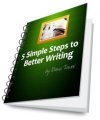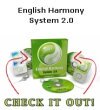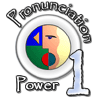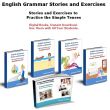Grammar Practice:
Present Perfect Vs Past Simple
Looking for some grammar practice? You have come to the right place and today we are going to look at the difference between the present perfect and the past simple.
What inspired me to focus on this?
Well...even I make mistakes,right Andre? :), but most of the time my mistakes are typos
(typo: when you don't see a mistake and therefore do not correct it or you make a mistake when you are typing.)
So I wanted to create this page to really make the following grammar distinction clear.
When should you use the present perfect?
Before we get to our grammar practice for today let's look at the theory. According to Michael Swan (my "grammar" hero) he writes that,
"We use the present perfect especially to say that a finished action or event is connected with the present in some way"
... or in other words, we are thinking about the past and present simultaneously. Also note that we are referring to a none specific time period so we don't use expressions relating to a specific times in the past like yesterday, last week, last class etc.
Let's look at some examples before we get to the actual grammar practice:
* I have had dinner there before.
* I have visited Paris.
* I have seen your wedding photos.
* A man has walked on the moon.
When do you use the past simple?
The past simple (or simple past) is used when an action or event starts and finished in the past. Here are some examples to help you see the difference.
* I went to the doctor (last Monday).
* I spoke to my mother (this morning).
* I finished work at 8pm (yesterday).
* I went to Disney world.
(Note: you do not have to refer to the time period for the sentence to be correct. You could say that you went to the doctor...or that you went to the doctor last Monday. Both are correct.)
Grammar Practice Time!
Fill in the blanks in the following sentences with the correct tense... either the present perfect or the past simple.
1) I (visit, never) ____________ Australia, but I (go) ___________ to England several times.
2) The last time I (go) __________ to England I (stay) _________ with my Aunt and Uncle.
3) Our plane (arrive) _________ late, so my uncle (wait) ________ in the airport for over an hour.
4) He (brought) __________ a book from home though, so he was able to read.
5) In the last 5 years I (only saw) __________ my Aunt and uncle once.
6) My Aunt could not believe how much I (change) _________.
7) I (to lose) __________ 20 pounds and (cut) _________ my hair very short since she last saw me.
8) The last time I (go) _______ to England I (rent) _________ a car.
9) This time my Uncle (offer) _________ to lend me his car and I (accept) ____________.
10) I (not visit) ___________ them for almost a year but I (write) _________ them many emails since then.
When you are finished,
check your answers below
1) I have never visited Australia, but I have gone to England several times.
2) The last time I went to England I stayed with my Aunt and Uncle.
3) Our plane arrived late so my uncle waited in the airport for over an hour.
4) He had brought a book from home though, so he was able to read.
5) In the last 5 years I have only seen my Aunt and uncle once.
6) My Aunt could not believe how much I had changed.
7) I had lost 20 pounds and had cut my hair very short since she last saw me.
8) The last time I went to England I rented a car.
9) This time my Uncle offered to lend me his car and I accepted.
10) I have not visited them for almost a year but I have written them many emails since then.
Discover the English Grammar Revolution:
Elizabeth's grammar program gives you daily mini lessons to use over 37 weeks (a typical school year.
You don't have lots of time so each lesson is short and easy to use.
The lessons are organized so that they gradually become more complex but build on what you have already learnt.
Visit English Grammar Revolution and explore Elizabeth's "Get Smart" Grammar program.
I hope that this grammar practice has helped you internalize and understand the difference between these two tenses.
I hope that you will begin to use them correctly when you speak, write and interact with others in English.
For more grammar practice check out Elizabeth's wonderful website and courses!

Still looking? Search the site for exactly what you need using the site search box below.
Happy exploring!
Discover these Amazing ESL Materials!
 |
 |
 |
 |
 |
 |
 |
 |
 |
 |

New! Comments
What do you think about this page? Leave me a comment in the box below.